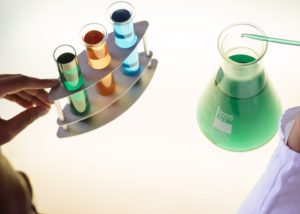Welcome to
the Blog
Replete Wellness
RW
Test, Don’t Guess! The Must-Have Lab Tests for Acne
The Must-Have Lab Tests for Acne: when it comes to your skin, we believe in testing over guessing! While doctors, scientists and researchers all unanimously agree on how acne forms (oil + inflammation + bacteria), the why is not so obvious. There are numerous root causes of acne and understanding the reason behind your acne can help you treat breakouts from the inside out for more permanent results.
Not only will understanding the root cause of your acne help you see results from your treatment plan more quickly, it will also tell us so much more about your overall health. Acne is a signal from your skin that something you’re doing isn’t working for you and is creating dis-ease within your body. A Replete functional medicine approach to lab testing seeks to uncover the specific imbalances that are at the root of your breakouts. All humans are unique and there are many causes of acne, which is why it’s so important to test and see what specifically is causing your skin problems. Functional testing used at Replete Wellness is individualized to each patient so that your Naturopathic doctor can come up with an effective treatment plan to address your unique case.

THE COMMON CAUSES OF ACNE:
In order to determine which labs tests for acne are right for you, it’s important to first understand the most common causes of acne:
- Diet: Dairy and sugar both cause a spike in a protein called IGF-1 which causes your skin to produce excess oil and also increases inflammation; two of the main factors involved in acne. While some foods are obvious when it comes to your skin health, others can be a bit more difficult to identify. Eating too many of your personal food sensitivities (even if they’re foods that would be considered healthy for most people!) causes your body to form IgG immune protein complexes every time you’re exposed these foods, resulting in inflammation and breakouts. Research shows higher levels of IgG immunoglobulins in the skin of patients with acne and food sensitivities are one of the most important drivers of these inflammatory immune proteins. Acne caused by food sensitivities will typically appear on the cheeks, forehead and around the mouth, and will often persist all month long despite hormonal changes.
- Hormone Imbalances: Acne can be caused by elevated Androgens (male hormones), deficient female hormones (often progesterone), excess inflammatory estrogens (4-OH) or a hormonal condition called PCOS which is caused by elevated androgens, increased inflammation and insulin resistance – the trifecta of hormonal breakouts. While there are a ton of different reasons why you may be experiencing hormonal acne, just has many skin & acne ‘experts’ in the online space offering up one-size-fits-all recommendations for clear skin which typically worsen acne in the long term. For instance, a woman with elevated androgens will actually do much worse on a “hormone balancing” protocol directed at clearing estrogens since those ovarian estrogens were actually helping to balance out all that excess testosterone. Hormones are seriously important when it comes to your skin & overall health so we strongly discourage you from blindly following hormone ‘advice’ from instagram influencers (no matter their follower count, or the number of made up / unregulated credentials they have listed behind their name) without checking your hormone levels with an actual expert (aka doctor!) first.
- Inflammation: Inflammation in the skin leads to an increase in glycoproteins IL-6, IL-8, IL-12 & IL-17 which encourages the growth of acne-causing bacteria on the skin. Increased levels of P. acnes bacteria then causes the immune system to secrete even more inflammatory glycoproteins resulting in even more inflammation and even more acne … you can see how this could become a problem … some women have genetic SNPs (the most common type of genetic variation among people) that make them secrete more of these inflammatory proteins, which can be fairly easily corrected with supplements along with some key diet and lifestyle changes. Inflammatory acne often gets worse with a diet rich in trans-fats + omega 6’s (plant oils), and is located across the entire face.
- Stress: Increased cortisol (stress hormone) levels leads to increased sebum thickness in the pores of the skin causing it to be oiler and more prone to acne. While stress plays a role in most women’s acne it can be more influential in women that have a dysregulated HPA-axis; a complex set of feedback interactions between the hypothalamus, the pituitary gland and stress hormone-producing adrenal glands.
- Insulin Dysregulation: This is one of the most overlooked hormones when it comes to acne as we’ve yet to see a dermatologist or medical doctor actually test insulin levels in any patient that we’ve co-treated thus far. Insulin is super important when it comes to acne since it becomes very difficult to clear your skin if your blood sugar levels are out of balance. Your body makes insulin every time you eat but makes higher levels after ingesting sugar and refined carbohydrates. High insulin levels cause an increase in a protein called insulin like growth factor or IGF-1, which is one of the worst acne culprits. IGF-1 causes sebaceous glands (the glands in your skin that regulate oil production) to go into overdrive and also increases the cell turnover in your skin. This means that insulin fluctuations lead to an overproduction of dead skin cells and excess oil, which creates an ideal scenario for the acne-causing bacteria propionibacterium acnes to grow on your skin, leading to inflammation and acne. Fortunately, a simple blood test can help us figure out the degree to which insulin levels are impacting your skin (more on that below!).

IMPORTANT LABS FOR ACNE PATIENTS:
We encourage you to print out this list to bring to your next visit with your naturopathic doctor or functional medicine doctor so you can have a discussion as to which tests are most indicated for you:
- HbA1C, Fasting insulin + Fasting glucose: While most doctors will run a fasting glucose and HbA1C test very few are actually testing fasting insulin levels as well. Glucose testing without insulin testing is essentially useless since we can’t actually determine what your body is doing with those blood sugars unless we also know how much insulin it’s making. HbA1C can be useful stand-alone test but it will miss the extreme fluctuations in insulin levels which contribute to acne since it only provides an average of the total amount of insulin your red blood cells of seen in a 120 day period (if your insulin is constantly spiking and dropping in response to food your levels will typically look quite normal since HbA1C just reflects an average). It’s important to test all 3 of these blood markers to help us get an accurate reflection of your blood sugar levels and determine whether or not insulin dysregulation is at the root cause of your acne.
- ESR, CRP: These are relatively easy, inexpensive, non-specific tests that are commonly used to help detect inflammation levels associated with conditions such as acne. While not specific they can still be a good starting place if you’re working with medical doctors who don’t have access to, or training in functional labs.
- Adrenal Cortisol Panel: This salivary test looks at your stress hormone levels throughout the day and can help us determine whether or not cortisol dysregulation is the root cause of your skin issues. Researchers typically only salivary testing of adrenal hormones when they want accurate results since blood levels of cortisol fluctuate so quickly and will often be falsely elevated in response to the fact that you’re in a lab getting blood taken from your body with a giant needle, duh.
- Salivary Hormone Panel: While many doctors will agree to test your hormones with a blood test the problem lies in the fact that hormones are not biologically active in the blood stream so this method of testing does not always give accurate results (free testosterone is the exception here, since studies show that serum levels of this one particular male hormone can accurately reflect physiological levels). Salivary testing shows us your functional hormone levels since saliva results will accurately show us hormones concentrations at their biologically active sites in the tissues of the body. Salivary hormone testing is less specific than our preferred urinary hormone testing but it’s also significantly cheaper and may be a better place to start if the more comprehensive testing feels a bit too expensive at the moment.
- DUTCH / CHI Testing: The advantage of specialized urine testing is that it measures both parent hormones and metabolites. Metabolites are an important addition to your overall hormone picture since they can help us to understand what underlying pathology is causing your hormones to become imbalanced in the first place. For example, this test will tell us whether or not there is a problem with 5-alpha-reductase & DHT conversion, an important enzyme that is often involved in acne. As an added bonus urinary hormone testing can also look at stress hormones and sleep hormones, giving you the most complete picture of your overall health. At Replete we’ve recently switched over to RMA’s CHI urinary hormone testing; it’s more comprehensive (ie: has additional hormone markers not tested with DUTCH testing) and is actually less expensive for our patients.
- Food Sensitivity Testing: While it’s advisable for all acne sufferers to reduce overall dairy and sugar this test will help us to determine which exact foods are causing your breakouts in order to avoid having to eliminate entire food groups while clearing up your skin.
- Genetic Testing: At Replete Wellness we LOVE helping patients to interpret their genetic data collected through sites like 23+me in order to develop a truly personalized wellness protocol. While 23+me does a good job of reporting on fun SNPs (genetic variations) related to things like toe length and exercise stamina they actually test for thousands of raw genetic data points that they don’t interpret for you or comment on. These SNPs are a wealth of information when it comes to your skin health since it can tell us which vitamins you’re likely deficient in (for example: we had a patient last week who’s genes made her susceptible to having low D, zinc, omega and vitamin A – ALL of which are linked to skin health), how well you detoxify and your levels of inflammation. Your naturopathic doctor at replete can help you access these unreported SNPs from the raw data collected from your sample to help you understand your skin and overall health as it relates to your genes.
Looking to connect with a Naturopath in Oakville to develop a personalized acne protocol to clear your skin from the inside-out? Book your in-person appointment here or your virtual visit here.

REFERENCES:
- https://www.ncbi.nlm.nih.gov/pubmed/23719144
- https://www.ncbi.nlm.nih.gov/pubmed/24719062
- https://www.ncbi.nlm.nih.gov/pmc/articles/PMC1606623/
- https://www.ncbi.nlm.nih.gov/pubmed/24584396
- https://www.ncbi.nlm.nih.gov/pubmed/25176476
- https://www.ncbi.nlm.nih.gov/pubmed/1830321
- https://www.ncbi.nlm.nih.gov/pubmed/26290018
- https://www.ncbi.nlm.nih.gov/pubmed/23377402
- https://www.ncbi.nlm.nih.gov/pubmed/22975487
- https://www.ncbi.nlm.nih.gov/pubmed/8775289
- https://dutchtest.com/wp-content/uploads/2017/05/DUTCH-Complete-White-Paper.pdf
- https://pmj.bmj.com/content/75/884/328
If you’re interested in learning more about how naturopathic functional medicine can help to clear your skin you can book an online appointment with Dr. Sarah here. (note: naturopathic care is only available to patients living in Ontario, Canada).
+ COMMENTS